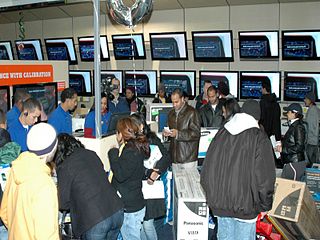
Consumer electronics or home electronics are electronic equipment intended for everyday use, typically in private homes. Consumer electronics include devices used for entertainment, communications and recreation. These products are usually referred to as black goods due to many products being housed in black or dark casings. This term is used to distinguish them from "white goods" which are meant for housekeeping tasks, such as washing machines and refrigerators, although nowadays, these would be considered black goods, some of these being connected to the Internet. In British English, they are often called brown goods by producers and sellers. In the 2010s, this distinction is absent in large big box consumer electronics stores, which sell entertainment, communication and home office devices, light fixtures and appliances, including the bathroom type.
A grey market or dark market is the trade of a commodity through distribution channels that are not authorized by the original manufacturer or trade mark proprietor. Grey market products are products traded outside the authorized manufacturer's channel.

Best Buy Co., Inc. is an American multinational consumer electronics retailer headquartered in Richfield, Minnesota. Originally founded by Richard M. Schulze and James Wheeler in 1966 as an audio specialty store called Sound of Music, it was rebranded under its current name with an emphasis on consumer electronics in 1983.
In economics and industrial design, planned obsolescence is the concept of policies planning or designing a product with an artificially limited useful life or a purposely frail design, so that it becomes obsolete after a certain pre-determined period of time upon which it decrementally functions or suddenly ceases to function, or might be perceived as unfashionable. The rationale behind this strategy is to generate long-term sales volume by reducing the time between repeat purchases. It is the deliberate shortening of the lifespan of a product to force people to purchase functional replacements.
An extended warranty, sometimes called a service agreement, a service contract, or a maintenance agreement, is a prolonged warranty offered to consumers in addition to the standard warranty on new items. The extended warranty may be offered by the warranty administrator, the retailer or the manufacturer. Extended warranties cost extra and for a percentage of the item's retail price. Occasionally, some extended warranties that are purchased for multiple years state in writing that during the first year, the consumer must still deal with the manufacturer in the occurrence of malfunction. Thus, what is often promoted as a five-year extended guarantee, for example, is actually only a four-year guarantee.
In law, a warranty is an expressed or implied promise or assurance of some kind. The term's meaning varies across legal subjects. In property law, it refers to a covenant by the grantor of a deed. In insurance law, it refers to a promise by the purchaser of an insurance about the thing or person to be insured.

Online shopping is a form of electronic commerce which allows consumers to directly buy goods or services from a seller over the Internet using a web browser or a mobile app. Consumers find a product of interest by visiting the website of the retailer directly or by searching among alternative vendors using a shopping search engine, which displays the same product's availability and pricing at different e-retailers. As of 2020, customers can shop online using a range of different computers and devices, including desktop computers, laptops, tablet computers and smartphones.
Consumables are goods that are intended to be consumed. People have, for example, always consumed food and water. Consumables are in contrast to durable goods. Disposable products are a particular, extreme case of consumables, because their end-of-life is reached after a single use.

Electronic waste recycling, electronics recycling, or e-waste recycling is the disassembly and separation of components and raw materials of waste electronics; when referring to specific types of e-waste, the terms like computer recycling or mobile phone recycling may be used. Like other waste streams, reuse, donation, and repair are common sustainable ways to dispose of IT waste.

A wrecking yard, scrapyard or junkyard is the location of a business in dismantling where wrecked or decommissioned vehicles are brought, their usable parts are sold for use in operating vehicles, while the unusable metal parts, known as scrap metal parts, are sold to metal-recycling companies. Other terms include wreck yard, wrecker's yard, salvage yard, breaker's yard, dismantler and scrapheap. In the United Kingdom, car salvage yards are known as car breakers, while motorcycle salvage yards are known as bike breakers. In Australia, they are often referred to as 'Wreckers'.
Remanufacturing is "the rebuilding of a product to specifications of the original manufactured product using a combination of reused, repaired and new parts". It requires the repair or replacement of worn out or obsolete components and modules. Parts subject to degradation affecting the performance or the expected life of the whole are replaced. Remanufacturing is a form of a product recovery process that differs from other recovery processes in its completeness: a remanufactured machine should match the same customer expectation as new machines.
A service plan is a contract to purchasers of products for an additional fee. While service plans resemble extended warranties, there are several important differences between the two, often cited by retailers that sell them.
Lemon laws are laws that provide a remedy for purchasers of cars and other consumer goods in order to compensate for products that repeatedly fail to meet standards of quality and performance. Although many types of products can be defective, the term "lemon" is mostly used to describe defective motor vehicles, such as cars, trucks, and motorcycles.
A certified pre-owned car or CPO is a type of used car. It is also used in references to guns and phones. The term "certified pre-owned was conceived by corporations in order to find a more favorable alternative to marketing products as 'used,' which causes consumers to impose their cognitive biases associated with 'used' items onto prospective purchases. There is no distinction or standard as to what is the difference between a used item and a certified pre-owned one, except that it is implied the certified pre-owned has been inspected and confirmed as working. Inspection, refurbishing, certification of functioning and other methods are sometimes employed by companies, but there is no standard for what distinguishes that which is certified pre-owned from something that is used.
Electronics manufacturing services (EMS) is a term used for companies that design, manufacture, test, distribute, and provide return/repair services for electronic components and assemblies for original equipment manufacturers (OEMs). The concept is also referred to as electronics contract manufacturing (ECM).

Reuse is the action or practice of using an item, whether for its original purpose or to fulfill a different function. It should be distinguished from recycling, which is the breaking down of used items to make raw materials for the manufacture of new products. Reuse—by taking, but not reprocessing, previously used items—helps save time, money, energy and resources. In broader economic terms, it can make quality products available to people and organizations with limited means, while generating jobs and business activity that contribute to the economy.

Mobile phone recycling describes the waste management of mobile phones, to retrieve materials used in their manufacture. Rapid technology change, low initial cost, and planned obsolescence have resulted in a fast-growing surplus, which contributes to the increasing amount of electronic waste around the globe.
Recommerce or reverse commerce is the selling of previously owned, new or used products, mainly electronic devices or media such as books, through physical or online distribution channels to buyers who repair, if necessary, then reuse, recycle or resell them.

Swappa functions as a peer-to-peer marketplace, facilitating the buying and selling of both new and gently used technology products. The platform establishes a direct connection between buyers and sellers, emphasizing that all listed devices must be fully operational to be eligible for sale. To uphold this standard, Swappa has a dedicated customer service team responsible for reviewing listed devices.
Right to repair is a legal right for owners of devices and equipment to freely modify and repair products such as automobiles, electronics, and farm equipment. Right to repair may also refer to the social movement of citizens putting pressure on their governments to enact laws protecting a right to repair.







